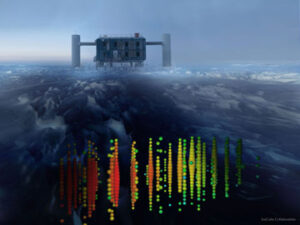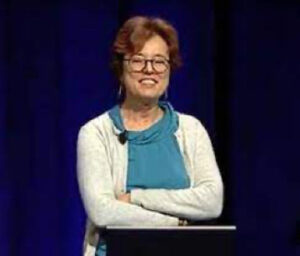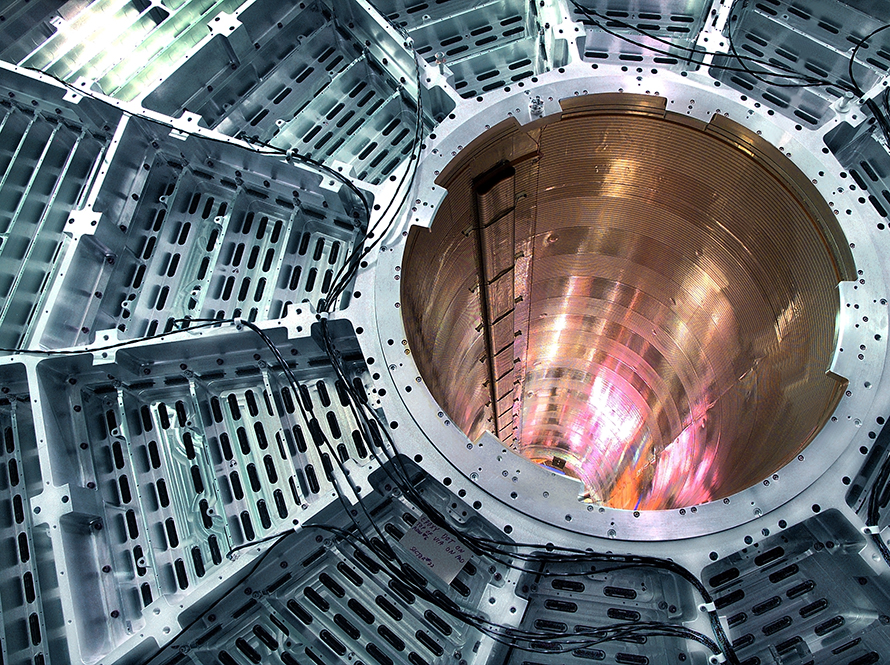 The IceCube Collaboration was awarded the 2021 Bruno Rossi Prize from the American Astronomical Society, for “for the discovery of a high-energy neutrino flux of astrophysical origin.” LBNL played (and continues to play) a key role in IceCube, with NSD serving as the lead division within the lab; at least four other divisions contributed to IceCube. We developed the concept of digital optical modules, designed and built the data acquisition systems for all 5400 optical modules, and made significant contributions to online and offline software and data analysis, including the first measurement of the flavor ratio of the astrophysical neutrino flux.
The IceCube Collaboration was awarded the 2021 Bruno Rossi Prize from the American Astronomical Society, for “for the discovery of a high-energy neutrino flux of astrophysical origin.” LBNL played (and continues to play) a key role in IceCube, with NSD serving as the lead division within the lab; at least four other divisions contributed to IceCube. We developed the concept of digital optical modules, designed and built the data acquisition systems for all 5400 optical modules, and made significant contributions to online and offline software and data analysis, including the first measurement of the flavor ratio of the astrophysical neutrino flux.

Barbara Jacak has been elected to membership in the American Philosophical Society. The American Philosophical Society is the oldest learned society in the United States, founded in 1743 by Benjamin Franklin.

Heather Crawford has been awarded a DOE Early Career Award, based on her proposal to enable nuclear structure studies in the most neutron-rich nuclei that will be available at the future FRIB facility. A liquid hydrogen target will be designed and constructed, coupled with a compact charged particle detection system to increase the luminosity for reactions with very rare (low-rate) nuclei at FRIB. The project will enable an extended experimental reach and make use of this enabling technology in studies of magnesium, calcium, and iron isotopes.

As of 27th March, the SNO+ Collaboration has completed liquid scintillator fill of the kton-scale neutrino detector, located 2 km underground in an active nickel mine at SNOLAB, Canada. The SNO+ detector will have sensitivity to a broad program of low-energy neutrino physics. LBNL plays a lead role in detector operations, calibration, and scientific analysis.
 On February 27, NSD, the Advanced Light Source (ALS), the Lab’s K-12 office, and staff volunteers from different divisions at the Lab hosted the 10th annual Nuclear Science Day for Scouts. This 10th-anniversary event was scheduled originally for last March but postponed until this year due to COVID. About 200 scouts participated in this virtual event. They learned about nuclear science and STEM careers through online lectures, hands-on activities using a science kit shipped to the participants prior to the event, and interviews with scientists and engineers. At the end of the event, the participants enjoyed a virtual tour of the ALS. At the event this year, we reached the milestone of having hosted 2000 scouts since the inception of this annual event in 2011.
On February 27, NSD, the Advanced Light Source (ALS), the Lab’s K-12 office, and staff volunteers from different divisions at the Lab hosted the 10th annual Nuclear Science Day for Scouts. This 10th-anniversary event was scheduled originally for last March but postponed until this year due to COVID. About 200 scouts participated in this virtual event. They learned about nuclear science and STEM careers through online lectures, hands-on activities using a science kit shipped to the participants prior to the event, and interviews with scientists and engineers. At the end of the event, the participants enjoyed a virtual tour of the ALS. At the event this year, we reached the milestone of having hosted 2000 scouts since the inception of this annual event in 2011.
